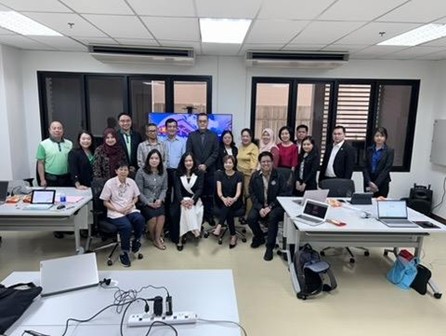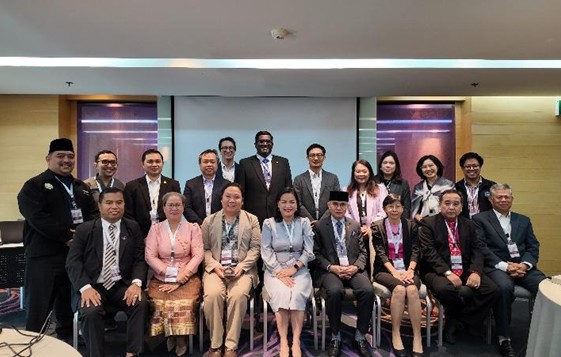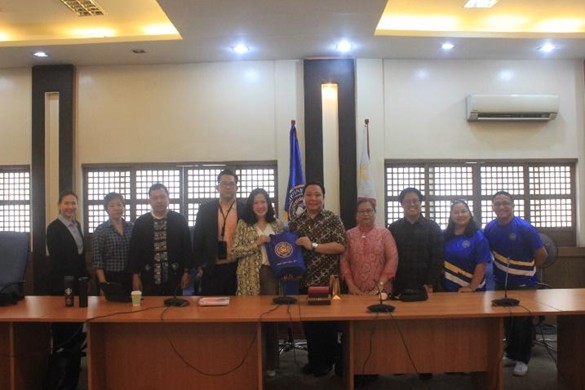The Association of Southeast Asian Teacher Education Network (AsTEN) is a network of premier leading Teacher Education Institutions (TEIs) of the countries in the ASEAN. The goal of the association is to address issues, challenges, and concerns relevant to teacher education programs, practices and policies in the ASEAN Region. It will also serve as a vehicle for collaboration in both academic and research endeavors within and across member institutions that will ultimately benefit the ASEAN nations and peoples.
As a member of AsTEN, the TEI must meet the following criteria:
is a leading institution/university in teacher education in the ASEAN member country;
makes significant contributions to Education/Teacher Education in the area of Curriculum, Research and Instruction;
offers advanced degrees in Education and related disciplines preferably on various specializations; and,
has international linkages and partnerships with institutions, especially in the ASEAN region.
AsTEN envisions to prepare and to adapt to the changes and challenges brought about by the ASEAN integration, with a focus on Teacher Education.

The adoption of the Declaration of ASEAN Concord II (Bali Concord) in Bali, Indonesia on 7 October 2003 to establish an ASEAN Community by 2020 necessitates the improvement of the quality of teacher education in the region through collaborations and partnerships in instruction, research and publication, faculty and student exchanges, among others. Thus, in order to facilitate these activities, a network of Teacher Education Institutions is needed.
The Philippine Normal University (PNU), in cooperation with the Department of Foreign Affairs (DFA) and the Commission on Higher Education (CHED), envisioned the establishment of the Association of Southeast Asian Nations Teacher Education Network (AsTEN) and the conduct of an ASEAN Teacher Education Network.
On September 17, 2014, university presidents from various TEIs in the ASEAN region gathered to establish AsTEN with Dr. Ester B. Ogena, president of PNU, presiding the meeting. To formalize the establishment of the network, a Memorandum of Understanding (MoU) and an AsTEN Charter were signed during the said occasion. It was followed by a conference on ASEAN Teacher Education which showcased different studies on the trending issues on teacher education.
The projects and initiatives of AsTEN are the heart and soul of the network that provides venue for international collaboration on teacher education. Such initiatives should be well-organized and aligned to the strategic directions of the network by clustering it into various platforms.
The upcoming projects and initiatives of AsTEN is clustered into four (4) platforms namely, (1) Knowledge Creation; (2) Knowledge Sharing; (3) Knowledge Utilization; and (4) Knowledge Management. These platforms are also aligned to the key areas of the network as stated in its Memorandum of Understanding. The figure below shows the framework of AsTEN Initiatives as clustered into four major platforms.


Bangkok, Thailand — The Associate Editors of the Association of Southeast Asian Teacher Education Network (AsTEN) Journal of Teacher Education participated in a strategic planning workshop, held at Kasetsart University Faculty of Education, from March 18 to 22, 2025, to strengthen operations of the journal and work towards an improved rank on Scopus, considered one of the leading academic indexes. Read More

Bangkok, Thailand - The Association of Southeast Asian Teacher Education Network (AsTEN) held the Co-Creation Workshop for ASEAN Entities Capacity Strengthening Plan on 21-24 January 2025, at Pullman King Power Hotel, Bangkok, Thailand. This is part of an ongoing collaboration with the ASEAN-USAID Partnership Program in empowering ASEAN Entities through structured capacity building. Read More

Manila, Philippines - As part of its continuing efforts to foster cross-border academic collaboration and promote sustainable education, the Faculty of Education of Kasetsart University (KU), Thailand, visited the Philippines for the “Sustainable Education for Local Development – PNU-KU Joint Seminar.” The event was co-hosted by the Philippine Normal University (PNU), Manila, and the De La Salle Santiago Zobel School (DLSZS), serving as a platform for dialogue on education, sustainability, and innovation. Read More
The Association of Southeast Asian Teacher Education Network (AsTEN) Journal of Teacher Education is the flagship publication of AsTEN, a multidisciplinary peer- refereed international journal that will serve as the main platform by which the network’s initiatives are made known to the academic community. It is expected to provide a scholarly forum on the dynamics of teacher education and the current initiatives of AsTEN member institutions in the areas of research and publication, scholarship of teaching, teacher education leadership, curriculum and pedagogy, reciprocity program, quality assurance and harmonization of standards and other relevant topics which continue to shape and redefine teacher education in the ASEAN region.
MEMBERSHIP PROCESS AND GUIDELINES
A. DEFINITION OF TERMS
Board of Trustees – serves as the governing body of the network which composed of 1 member university for each ASEAN member state.
Associate Member – the member institutions coming from any of the 10 ASEAN member states (AMS) which are not part of the Board of Trustees(non-Board)
Local Network – serves as the local chapter of AsTEN in every ASEAN member state. Members of the local networks may not be automatically members of AsTEN at the regional level.
B. CRITERIA FOR MEMBERSHIP
The following are the criteria for associate membership:
The Associate Member must have a college or faculty of education and/or offering teacher education programs.
The Associate Member must have international involvement through various networks and other international collaborations.
The Associate Member must have an evident recognition and must prove its national standing in its country, e.g. accreditation, national awards, and entitlements.
The Associate Member must be a member of the local network of AsTEN in the member’s home country, if applicable.
C. DOCUMENTARY REQUIREMENTS
Letter of intent to join the network
Recommendation Letter from the Board Member of AsTEN representing the home country
An institutional profile which includes:
program offerings
international involvement and projects
evidence of national standing and recognition (e.g. accreditation, awards)
D. MEMBERSHIP PROCESS
The aspiring member institution must submit the relevant documents mentioned in Part C to the AsTEN Secretariat.
The deliberation and approval of the membership application will be held during the Meeting of Presidents. A referendum may be done if deemed necessary.
A simple majority vote of the Board of Trustees is needed for the approval of the membership application.
The aspiring member institution will be informed of the decision of the Board of Trustees regarding its application.
If approved, the final confirmation of membership will be given once the aspiring member institution has paid its first membership fee.
The member institution is expected to pay the annual membership fee amounting to USD 600 annually to renew its membership.
MEMBERSHIP PROCESS AND GUIDELINES FOR AsTEN Plus MEMBERSHIP
A. DEFINITION OF TERMS
Board of Trustees – serves as the governing body of the network which composed of 1 member university for each ASEAN member state.
AsTEN Plus Member – the member institutions coming from any countries outside ASEAN region (non-Board)
B. CRITERIA FOR MEMBERSHIP
The following are the criteria for associate membership:
The AsTEN Plus Member must have a college or faculty of education and/or offering teacher education programs.
The Associate Member must have international involvement through various networks and other international collaborations.
The AsTEN Plus Member must have an evident recognition and must prove its national standing in its country, e.g. accreditation, national awards, and entitlements
C. DOCUMENTARY REQUIREMENTS
Letter of intent to join the network
Recommendation Letter from the Board Member of AsTEN representing the home country
An institutional profile which includes:
program offerings
international involvement and projects
evidence of national standing and recognition (e.g. accreditation, awards)
D. MEMBERSHIP PROCESS
The aspiring member institution must submit the relevant documents mentioned in Part C to the AsTEN Secretariat.
The deliberation and approval of the membership application will be held during the Meeting of Presidents. A referendum may be done if deemed necessary.
A simple majority vote of the Board of Trustees is needed for the approval of the membership application.
The aspiring member institution will be informed of the decision of the Board of Trustees regarding its application.
If approved, the final confirmation of membership will be given once the aspiring member institution has paid its first membership fee.
The member institution is expected to pay the annual membership fee amounting to USD 600 annually to renew its membership.